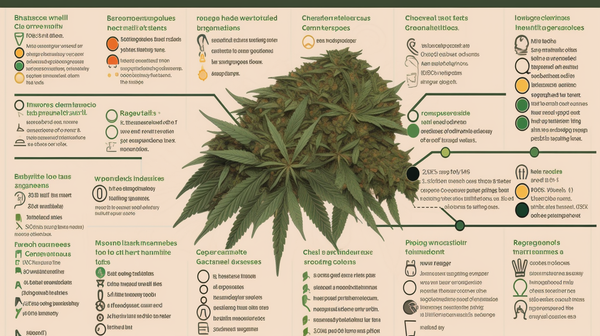"CANNABIS AGAINST COVID-19: UNVEILING THERAPEUTIC POSSIBILITIES"
Introduction
In the labyrinth of natural health remedies, Cannabidiol (CBD) has emerged as a beacon of hope and curiosity. This natural compound, derived from the cannabis plant, has sparked a revolution in how we perceive and utilize plant-based treatments.
With CBD's surging popularity, it's paramount to delve into its essence, legal status, and historical backdrop to fully grasp its potential. This comprehensive guide aims to demystify CBD, shedding light on its science, benefits, and the ever-evolving legal landscape.

The Science Behind CBD
At the heart of CBD's interaction with the human body lies the endocannabinoid system (ECS), a complex network of receptors and neurotransmitters that maintain bodily homeostasis.
CBD's unique ability to influence the ECS without the psychoactive effects associated with its cousin, THC, makes it an intriguing subject for scientific research and therapeutic applications. Understanding the ECS is crucial for comprehending how CBD can potentially impact health and well-being (Learn more about the ECS).

Potential Health Benefits
The potential health benefits of CBD are vast and varied, drawing attention from the medical community and wellness enthusiasts alike. Its purported therapeutic properties range from providing relief from chronic pain and inflammation to reducing anxiety and depression symptoms, offering a natural alternative to traditional medications.
CBD's neuroprotective effects suggest a promising avenue for disorders such as epilepsy and multiple sclerosis, while its anti-inflammatory and antioxidant qualities might support heart health and combat acne. Emerging research even explores CBD's role in cancer care, from alleviating treatment side effects to potential anti-tumor activities.
This spectrum of potential benefits highlights CBD's versatility as a compound, positioning it as a focal point in the ongoing exploration of natural substances for holistic health and well-being.
- Anxiety and Stress Relief: The anxiolytic properties of CBD have been highlighted in numerous studies, suggesting its efficacy in reducing anxiety and stress (Read about CBD and anxiety).
- Pain Management: CBD's role in pain management is particularly promising, offering an alternative for individuals seeking relief from chronic pain without the side effects of traditional painkillers (Discover CBD's pain-relief potential).
- Neuroprotective Properties: CBD's potential neuroprotective properties open new avenues in the treatment of neurodegenerative diseases, such as Alzheimer's and Parkinson's (Explore CBD's neuroprotective effects).
- Heart Health: Preliminary studies suggest CBD may benefit heart health by lowering blood pressure and reducing inflammation, markers of cardiovascular disease (Learn about CBD and heart health).
- Cancer Treatment Support: Beyond symptom management, CBD shows promise in reducing the side effects of cancer treatments and has been explored for its potential anti-tumor effects (Read about CBD in cancer care).

Usage and Dosage
Understanding the optimal usage and dosage of CBD is essential for harnessing its potential benefits while minimizing any adverse effects. CBD is available in various forms, including oils, capsules, creams, and edibles, each suited to different needs and preferences.
While there is no one-size-fits-all dosage, starting with a low dose and gradually increasing it based on individual response and tolerance is generally recommended (Guide to CBD dosage).
Legal Status and Quality Assurance
The legal landscape of CBD is complex and varies significantly by jurisdiction. In many regions, CBD derived from hemp with low THC levels is legal, but it's essential to stay informed about local laws and regulations (Check the current legal status of CBD).
Ensuring the quality and safety of CBD products is paramount, emphasizing the need for third-party testing and transparency from manufacturers (Learn about CBD quality assurance).
Personal Experiences with CBD
The tapestry of personal experiences with CBD is rich and varied, offering a mosaic of individual journeys that underscore its multifaceted potential. From those finding solace in CBD's calming embrace amidst the tumult of anxiety and stress, to the chronic pain sufferers who herald its analgesic properties as a beacon of relief, these stories are testament to CBD's impact on everyday lives.
Beyond mere anecdotes, these personal narratives weave together a collective testament to the nuanced and profoundly personal ways CBD can intersect with health and wellness. As each story unfolds, it not only adds depth to our understanding of CBD's potential benefits but also illuminates the diverse and personalized nature of its effects, fostering a community of shared experiences and insights.

The future of CBD holds immense promise as we stand on the brink of groundbreaking scientific discoveries and an expanding horizon of therapeutic applications. With ongoing research delving deeper into its pharmacological profile, CBD is poised to revolutionize areas of medicine, from mental health treatments to chronic pain management and beyond.
As regulatory frameworks evolve and societal acceptance grows, the potential for CBD to be integrated into mainstream healthcare and wellness regimens is unprecedented. This burgeoning field promises not only to unveil new mechanisms of action and therapeutic benefits but also to challenge and redefine our understanding of plant-based medicine in promoting human health and well-being.
Conclusion
CBD stands at the crossroads of traditional and alternative medicine, offering a natural pathway to health and well-being. As we navigate through its myriad benefits, legal intricacies, and scientific underpinnings, the journey with CBD is one of ongoing exploration and potential. With each new study, personal story, and legal development, we inch closer to unlocking the full promise of cannabidiol.
Frequently Asked Questions
Q: Can cannabis be considered a standalone treatment for COVID-19?
A: While certain studies suggest potential benefits of cannabis compounds in managing COVID-19 symptoms or effects, it cannot be considered a standalone treatment.
Effective COVID-19 management requires a comprehensive approach, including approved medications, vaccines, and supportive care. Cannabis may play a supportive role, subject to further research and clinical trials to fully understand its efficacy and safety in the context of COVID-19.
--
"Unlock the secret to organized and stylish cannabis storage with our premium stash boxes - visit our website now to discover your perfect match!"
--
|
More Articles here |
| "ELEVATE YOUR CANNABIS EXPERIENCE: A COMPREHENSIVE SMOKING GUIDE" |
| "THE ESSENTIAL GUIDE TO THC: EVERYTHING YOU NEED TO KNOW ABOUT CONSUMPTION AND EFFECTS" |







